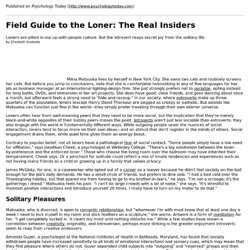

Field Guide to the Loner: The Real Insiders. Miina Matsuoka lives by herself in New York City.

She owns two cats and routinely screens her calls. But before you jump to conclusions, note that she is comfortable hobnobbing in any of five languages for her job as business manager at an international lighting-design firm. She just strongly prefers not to socialize , opting instead for long baths, DVDs, and immersion in her art projects. She does have good, close friends, and goes dancing about once a month, but afterward feels a strong need to "hide and recoup. " In our society, where extroverts make up three-quarters of the population, loners (except Henry David Thoreau) are pegged as creepy or pathetic. Loners often hear from well-meaning peers that they need to be more social, but the implication that they're merely black-and-white opposites of their bubbly peers misses the point.
Contrary to popular belief, not all loners have a pathological fear of social contact. Solitary Pleasures The Unhealthy Case of the Lonely Loner. Counseling: Long Distance Relationships. Relationships require a lot of work, whether they are ones that involve living together or those where you’re far apart from each other. However, those in which the couple are living at a far distance from each other require some special skills in order to work. The first key is a willingness to work, to focus on making this relationship successful. In order for this relationship to succeed, it will require you to be very intentional about your behavior. And your intention is to pay attention to this relationship, to nurture this relationship. The second key is a commitment to the relationship by each member of the relationship. The third key is communication that is effective. The fourth key is trust. The fifth key requires the art of balance.
When all of these are present, the sixth key seems to happen naturally; the sixth key is mutual respect. Clear expectations with each other is the seventh key component. Journal.Write them a letter telling them how your feel. Susan Cain: The power of introverts. Military Counseling Career - Become a Military Counselor. Explore the Military Counselor career...

Sometimes a service member’s reason to talk with a mental health specialist does not stem from a war wound or intense combat situation, does not require medication or long-term therapy, does not necessitate a team of professionals to coordinate care. Sometimes military personnel or family members only need one or two sessions with a military counselor to vent. Other times, however, counseling is needed to help an individual make a few behavioral changes, to sharpen coping skills, to resolve stressful interactions between family members.
Military counselors help people uncover their strengths and resources to solve immediate issues. Perhaps a National Guard member, serving on the Honor Guard, burying fellow service members four times a day, every day of the week, is struggling emotionally. A number of counseling positions are available in the military, varying in scope and responsibility depending on the counselor’s background. Volunteer - The Soldiers Project. Opinion: An optimists journey toward dropping the D-bomb. Stephanie Gallman CNN's Stephanie Gallman describes being diagnosed with depressionShe reveals how family and friends reacted to her dropping the "D-bomb'"Gallman says she was surprised because she thinks of herself as an optimist"Depression, until now, was my dirty little secret," she says Editor's note: Stephanie Gallman, a CNN assignment editor, was diagnosed with depression last year despite being a frequent exerciser, a fairly healthy eater and an avid fan of Hula-Hoops.
Watch Gallman tell her story this Saturday and Sunday at 7:30 a.m. ET on CNN's "Sanjay Gupta MD. " (CNN) -- In August, after several months of seeing a therapist and a psychiatrist, I was diagnosed with depression. The news came as a shock. "I'm not depressed," I said defiantly, shaking my head when the doctor deduced that must be what was ailing me. "I hate depressed people. " She laughed at my strange reaction, but I was serious. Her diagnosis sounded quite clinical. Well, that's just awesome. "Tend to your garden. "